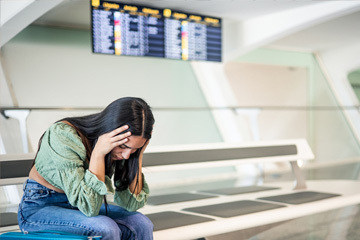Planning to fly with a baby? Don’t fret, we’re here to help you prepare. Here are our tips to put your worries at ease so that you can enjoy your holiday.

Flying with a baby
The secret to having the smoothest journey when travelling with your baby is to be organised. Here's how you can prepare for your flight.
Is there a minimum age requirement for flying?
It's best to check with the airline, as each will have different policies. Babies over two weeks old are usually allowed to fly. But, some airlines allow babies as young as one week with a doctor's note. This is particularly useful to know if you’ve given birth abroad and need to return home soon.
Tips for booking flights
Flying with a baby? You'll need a plan. Here's some travel tips to help.
Shop around and compare airlines
Different airlines have different policies and requirements for travelling with young children. So, just like comparing insurance, it's a good idea to compare airlines.
Some airlines allow a changing bag in addition to hand luggage, while others offer generous allowances for baby equipment. Most airlines allow you to take 2 large baby items. You hand these over at the gate before you get on the flight. This can include things like travel cots or car seats. Once handed over, you'll then collect them later with your luggage.
Check your airline's policies for travelling with babies
Can your baby have their own seat or must they sit on your lap? Do they offer priority boarding? Check these details for a smooth journey.
Book a seat for you and your baby
Book your seats as soon as possible. This ensures you get the best options for you and your baby. Think about whether a window or an aisle seat is best for you. Especially if you're seated among other passengers. If you're little one is active, an aisle seat may be better.
If you're travelling with others, it's best to sit near them so they can hand you anything you need. Some seats, like those near the emergency exit, might be off-limits when travelling with a baby or a toddler. These are usually shown on the seating plan when booking.
Usually, infants under the age of 2 don't have their own seat because they're expected to sit on their parents' lap. But, if you call the airline to book, you can sometimes book them a seat next to you for added comfort, and space. But, you'll have to pay a child fare. Not all airlines allow this, so you'll need to double-check.
Top tip: I've found booking a night flight to match my child's sleep routine helps us both have a more restful journey.
Preparing for a flight
Get your holiday checklist ready! Here are some things to consider as you prepare for your flight.
"As a parent who's travelled with my own baby, I've learnt that preparation is key.
My first top tip is to take a cabin-approved travel pushchair. This means you don't have to wait to collect it. You can use it when you step off the plane. This is helpful if there's any delays in getting your luggage.
Next, the changing facilities on airplanes are cramped. So, change your baby before boarding, so you've got a little more space.
If you're taking more than one suitcase, spread your baby's things across them. That way, if one gets lost, you'll still have most of what you need.
Finally, let's not forget travel insurance! This can help to ease any worries that are out of your control."
What to pack in your carry-on
Pack extra nappies, food, clothes, and any other essentials. A well-stocked carry-on can save you from stress during the flight. Make sure to include:
-
Baby’s passport
-
Nappies, wipes, nappy bags, and a changing mat
-
Baby medicine sachets like paracetamol and teething gel
-
Baby food and snacks
-
If needed, baby milk and sterilised water
-
Dummy or comforter
-
Baby blanket and muslins
-
Layers and a change of clothes for your baby
-
Small baby books, toys, anything to keep them entertained whilst on your lap or in their seat
-
Baby carrier or sling
-
If your baby is paticulary sensitive to loud noises a pair of ear defenders may help
-
It's also a good idea to pack a spare set of clothes for you. Just in case of any accidents while your baby is sitting on your lap!
- A photo of your child
- Supporting documents
- You'll need to ask someone to confirm your child’s identity
- Someone with parental responsibility must give consent for the application to be made
- You can find the specific documents for online and postal applications on the government website.
- Send original documents or official copies; photocopies aren't accepted. If you're baby is a newborn, it's a good idea to buy extra birth certificates when you register them
- Non-English or non-Welsh documents require certified translations
- Do not send laminated documents
- Hurrah - you're ready to go! The passport will be delivered by courier or Royal Mail.
- Tablets or smart devices with toddler-friendly apps
- Fidget toys
- Colouring books and crayons
- Check procedures. Call your airline and contact the embassy of your destination country for specific advice.
- Bring proof. Carry your children's birth or adoption certificates. If surnames differ, bring your marriage certificate and passport.
- Have proof of consent. Have a consent letter from the other parent if you're traveling alone with the baby.
- Wheelchair accessibility: If your child uses a wheelchair, check with your airline, hotel, and transfer providers about their accessibility options.Most airlines offer pre-boarding for disabled passengers. And, many airports provide assistance.
- Allergies: For children with severe allergies, it's best to let the airline and hotel know in advance. You may be able to ask the airlines not to serve certain foods during the flight.
- Essential medical supplies: Bring a good supply of medication and medical equipment. It may also be worth taking a doctor’s note detailing your child’s condition and needs.
- Inform staff: Don’t hesitate to ask for help or special accommodations.
Helpful hint: For me, it was easier to store everything in a backpack, rather than a holdall. That way I could keep my hands free while at the airport.
Stock-up on essentials
Before flying, ensure you have enough nappies and spares of other essentials. Airports might not have what you need. At some airports, you can pre-order items like baby milk, baby food, and sunscreen. You can pick them up from shops in the departure lounge.
If you’ve booked a return flight, it’s worth packing what you need for the flight home in your suitcase. This is in case you can’t find what you need while you’re away. Your preferred brands may not be available where you're going. Be mindful of perishables and wrap up anything that could leak as well.
Make sure you've got a passport for your baby
No matter how old you are, you need a passport to travel abroad - even tiny tots.
You can apply for a child passport on Gov.uk, and it will last for five years. You can apply online for £57.50. Or, you can apply by post, but it will cost £69.
What you'll need:
Supporting documents
Receiving the Passport
Once you've got the passport, check if there are any other travel documents you and your family need. This includes visas for the country you're visiting. It's easy to forget about your own passport when you're busy getting one sorted for your baby. Use our passport checker tool before you travel to make sure you've got enough time before it expires.
Flying with a toddler
Travelling with a toddler is a whole different ball game. So, how do you survive the flight?
Keeping them entertained
Pack activities or toys to keep your toddler entertained. Plan ahead to avoid boredom. You could take:
Dealing with ear pain
Give your little one snacks, drinks, or a dummy to ease ear pain. It helps when they swallow, relieving discomfort from pressure changes. Ouch!
Tips for long-haul flights
Planning a long-haul flight with your baby? You might need to do some extra prep to make it a smooth ride for both of you.
Prepare for potential delays or layovers
Pack extra essentials in case of delays. Plan activities to keep your baby entertained during layovers. Ensure you have enough nappies, snacks, and entertainment to keep them occupied.
Book a bassinet or cot
A bassinet or sky cot is a handy little carrycot that attaches to a bulkhead seat. If you're jet-setting on a long-haul flight with a baby who can't sit up yet, this could be a lifesaver. Newer planes tend to have sky cot seats. They have a secure harness, so they’re safe even during bumpy rides. You might have to pay extra to have the specific seat where these cots can be used. These types of facilities are limited, so it’s a bit of a race!
If you're on an older plane that uses bassinets, you'll need to take your baby out during turbulence. Also, each airline has its own rules and weight limits for using bassinets.
No matter how or where you’re traveling, the key is to do your homework on your airline’s infant policies and costs.
Remember to apply for a GHIC for your baby
Don't forget to get a Global Health Insurance Card (GHIC) for every family member on the trip. It can help you get free or cheaper emergency healthcare in the European Union during your trip. It's also worth double-checking which countries the GHIC covers.
What to do if you have a different surname for your child
If you have a different last name from your child, it's likely you'll need extra documents to prove your relationship with your child. Here's what to do:
What to do if your child has specific medical or physical requirements
If you're travelling with a child who has medical or physical needs it's best to plan ahead. Here are some tips to help you navigate the journey:
Don't forget travel insurance
If something goes wrong before or during your trip, having travel insurance can help to ensure you’re covered. You can also get travel insurance with medical cover, which includes emergency travel back home, delays, cancellations, and lost luggage. Remember to check that your baby's equipment in the hold, such as buggies or car seats, is also covered for damage, loss, or theft.
You might want to consider getting a quote for a family travel insurance policy. This covers up to two adults living together and up to eight kids under 18. Getting a family policy could save you money. The amount saved depends on how many children you're travelling with. It might be cheaper than insuring everyone separately.
It's a good idea to shop around to find cheap travel insurance that best suits your needs. Always remember to read the policy documents before buying your insurance to make sure it's right for you.
Compare travel insurance







